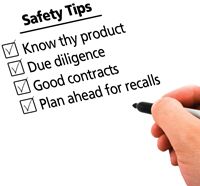Playing It Safe

Recent high-profile news reports of tainted food products such as peanuts and pistachios have overshadowed safety problems with dietary supplements.
Among the supplement safety scares that made headlines this past year: FDA issued a nationwide alert at the end of last year and then expanded the alert earlier this year when it found sibutramine, rimonabant, phenytoin, and phenolphthalein adulteration in 69 popular weight-loss supplement brands. Among the name-brand products were StarCaps, which has all but shut down its Web site. More recently, German scientists raised questions about the safety of Chinese slimming capsules after finding that the product contained sibutramine. Finally, 65 manufacturers and marketers of vitamin and mineral supplements were sued by the California Attorney General under Proposition 65 after FDA testing found the presence of lead in their supplements.
Marketers must rely on their own resources to protect themselves from adulterated ingredients. FDA provides limited help in identifying and halting the sale of potentially harmful ingredients. Unless a supplement product is imported, the agency usually conducts tests only after receiving consumer complaints. Supplement marketers are better off independently testing for potential adulterants by reviewing their current good manufacturing practices (CGMP).
Know what's in your product. All good manufacturing practices start with identity testing to make sure that what is in the product is there and in the correct amounts. Testing for adulterants should also be done. While this might seem obvious, had the supplement marketers that were placed in the glare of national news stories done just that, they might have avoided volumes of adverse publicity and litigation, and, for some, corporate ruin.
The CGMP process starts with careful selection of suppliers and contract manufacturers. Due diligence demands that these companies be investigated for past problems and monitored to make sure that quality standards are maintained. In these days when the slightest food scare can produce public relations and legal nightmares, scrutiny should be twice as strict.
Agreements should set conditions for ingredient and product quality. Marketers should also require suppliers and contract manufacturers to test using independent labs and to disclose those test results.
As part of their CGMP compliance procedures, marketers should have a playbook for responding to product defects and initiating a recall. There should be sections for corporate management, logistics, and public relations. All elements of the plan should be proactive and start with the premise that it is better to overdo protection of the consumer than face the wrath of public opinion and government officials.
Unfortunately, mistakes will happen and recalls will be necessary. To mitigate those costs, marketers should protect themselves in their agreements.
Consider also the role that recall liability insurance can play. Such coverage is becoming more prudent because of the number of high-profile recalls recently. A policy could pay for costs associated with the recall of a product due to problems related to manufacturing or adulterated ingredients. A number of insurance carriers are now selling this type of coverage.
The bunker mentality that influenced decisions at Peanut Corp. of America did not serve that company well. By contrast, Johnson & Johnson conducted the most remarkable recall of a product when several bottles of Tylenol contaminated with cyanide killed seven people. The company quickly determined that it could contain the threat to public safety and ordered every pill pulled from shelves. Not only did Johnson & Johnson live on, it saved one of the most popular and trusted brands still on the market today.
A similar approach in a world where consumers have become wary of product safety could turn what might be a nightmare into an opportunity to demonstrate concern for the public's welfare. The best approach is to establish layers of protection as early as possible.
Joel Rothman is an attorney in Boca Raton, FL, with the firm of Seiden, Alder, Matthewman & Bloch, P.A. Rothman also provides regulatory and consulting services to dietary supplement firms through his company, NutriCompliance. He can be reached at 561/416-0170. Rothman is also a member of the CANI Consultants Association. Their Web site is www.cani-consultants.org.
DOJ asks Utah court to dismiss FTC lawsuit against Xlear Inc.
March 11th 2025On March 10, the DOJ and the defendant filed a stipulation to dismiss with prejudice the lawsuit in which each party agrees “to be responsible for its own costs and fees and agrees that no party shall be responsible to any other party for any fines, costs, fees, or penalties arising from this case.”
HHS announces efforts to eliminate independent conclusion of GRAS
Published: March 11th 2025 | Updated: March 11th 2025U.S. Department of Health and Human Services (HHS) Secretary, Robert F. Kennedy Jr., is directing the acting U.S. Food and Drug Administration’s (FDA) acting commissioner to explore rulemaking that would eliminate the independent conclusion of GRAS provision.





